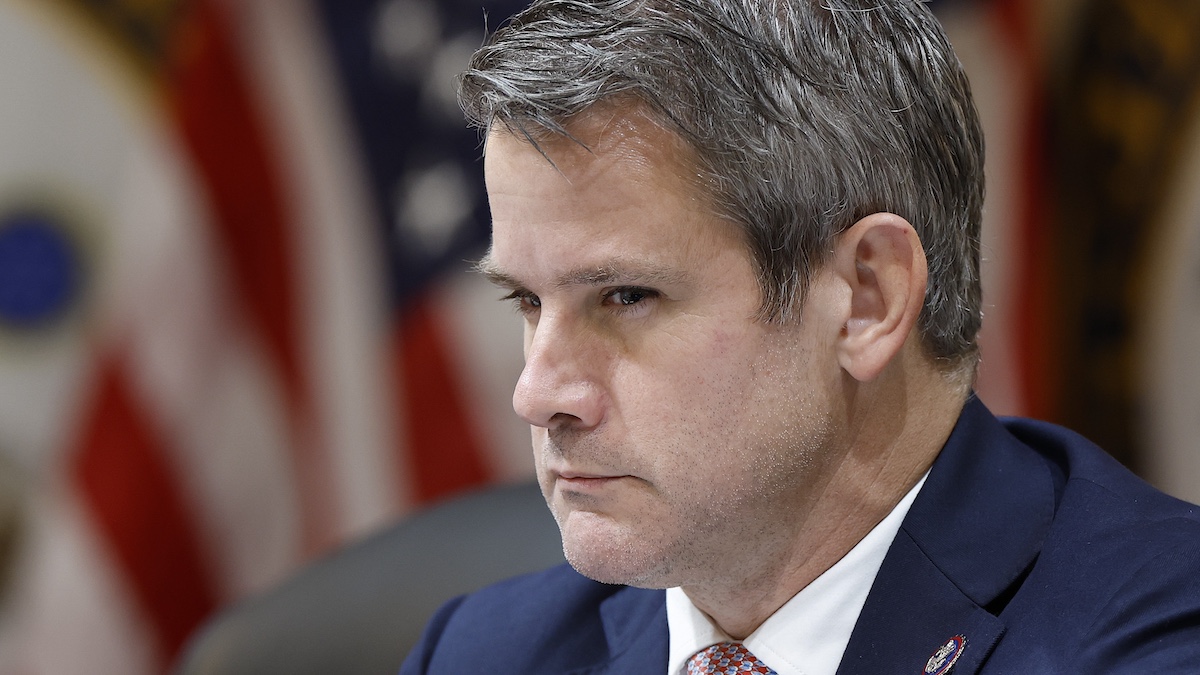
WASHINGTON, DC – DECEMBER 19: U.S. Rep Adam Kinzinger (R-IL) participates in the last meeting of the House Select Committee to Investigate the January 6 Attack on the U.S. Capitol in the Canon House Office Building on Capitol Hill on December 19, 2022 in Washington, DC. The committee is Photo by Anna Moneymaker/Getty Images
It’s almost like Trump doesn’t mean what he says.
The self-imposed two-week deadline Donald Trump set for punishing Russia has not only come and gone—it’s been buried under a mountain of fresh nuclear concessions.
Adam Kinzinger is here to remind everyone that when it comes to Trump’s promises on Moscow, there’s more hot air than heat.
Back in May, Trump, facing mounting criticism for his cozy rhetoric toward Russia and Vladimir Putin, told a crowd he would slap additional sanctions on the Kremlin within “two weeks.” That vague but bold proclamation immediately raised eyebrows, particularly for former Republican Rep. Adam Kinzinger, who has made a second career of holding Trump’s feet to the fire since departing Congress.
Trump just bloviating? Say it ain’t so
Now, weeks later, the only thing getting sanctioned appears to be the truth. Instead of tightening restrictions, the Trump administration just loosened several sanctions tied to Russia’s civil nuclear energy sector. Yes, you read that right: while Ukrainians continue to fight for their sovereignty and Europe scrambles to reduce dependency on Russian energy, Trump has given Moscow a pass—at least when it comes to nuclear deals that benefit Hungary and Russia’s state-linked banks.
According to a new U.S. Treasury license issued June 27, American entities can now conduct transactions with Russian financial giants like Gazprombank, Sberbank, and VTB—so long as the projects support foreign nuclear energy ventures launched before November 2024. One such beneficiary? Hungary’s €12 billion Paks II nuclear plant, a joint venture with Rosatom, Russia’s state-owned atomic energy behemoth.
Kinzinger’s reaction was swift, sharp, and signature Kinzinger. “Hey Donald, been 5 weeks since you said you’d have more sanctions on Russia ‘in two weeks.’ Where uh, where are they?” he posted sarcastically on X (formerly Twitter). “NO WAY YOU WERE JUST BLOVIATING RIGHT??? NO WAY.”
Trump’s threat becomes Putin’s gift
The jab cut deeper because it echoed a truth that even Trump’s allies have come to recognize: when it comes to foreign policy, especially Russia, the bluster often outpaces the backbone. For Kinzinger—an Iraq War veteran and one of only two Republicans on the January 6 Committee—the failure to hold Moscow accountable isn’t just political laziness; it’s a dangerous abdication of America’s global leadership.
And this isn’t the first time Trump has raised eyebrows by appeasing Russia. His first term was marked by warm praise for Putin, slow-walked sanctions, and a Helsinki press conference that many saw as nothing short of capitulation. Critics now argue that by quietly greenlighting financial flows to Russian nuclear projects, Trump is once again choosing business over deterrence.
Of course, there are those who argue that civil nuclear exemptions serve U.S. strategic interests by keeping an eye on international reactors and maintaining influence over supply chains. But that nuance is lost when the move comes just weeks after a grand promise of “more sanctions”—a promise that now looks less like strength and more like sleight-of-hand diplomacy.
Kinzinger isn’t letting it slide. “This should be bigger news,” he added in another tweet, highlighting the Treasury’s quiet move to ease penalties on Russian banks. It’s a reminder that while Trump keeps talking, it’s often Kinzinger—and reality—that brings the receipts.



Published: Jun 30, 2025 04:34 pm